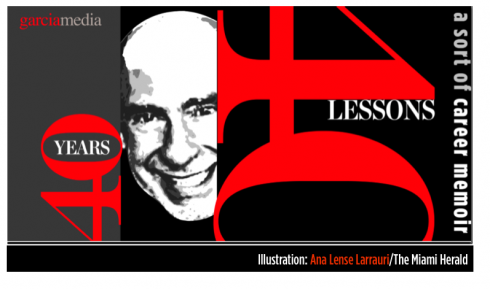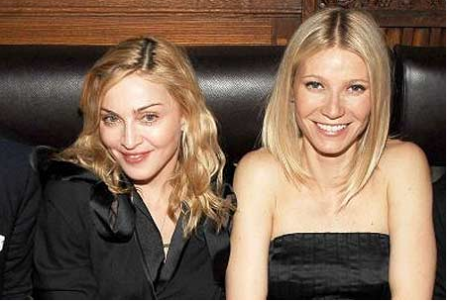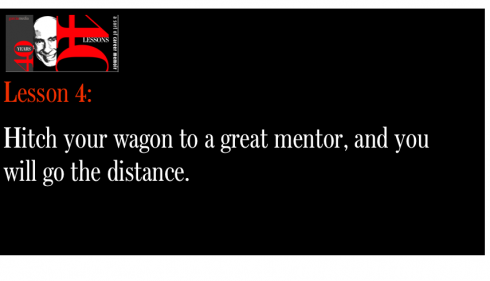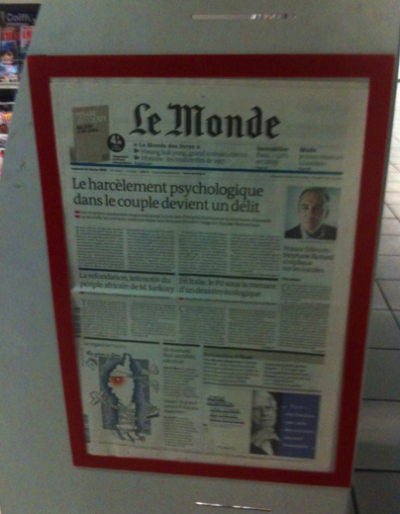TAKEAWAY:This is part 4 of my occasional series 40 Years/40 Lessons, which I call a “sort of career memoir” capturing highlights and reminiscing about what has been a spectacular journey for me, doing what I love most. Today’s segment: Mentors play a key role to help us make it to the finish line PLUS: Why does that front page will not sell!
Everyone needs a mentor



Madonna is mentor to Oscar winning actress Gwyneth Paltrow
I had the best mentors and, perhaps, as a result, I also have had the best mentorees.
I was lucky to encounter mentors in the BPC era. Yes, Before Personal Coaches.
One can now recruit a personal coach, interview several potential candidates then pick the one we wish to assist us to do a job more effectively and/or to progress in our careers.
Personal coaches are now part of the fabric of networking, advancing and beating the competition. In my growing up years, we had no personal coaches as such. Instead, we had mentors.
A mentor would appear without the prerequisite interview.
They were not hired.
There was no transaction, except for that one day when you just knew you had met your mentor. It is hard to tell how you knew you were in the presence of your mentor one fateful day, but you just knew it.
I have to admit that the process was rather informal, highly personal and not as military sounding as it seems to be today, when personal coaches begin by plotting “strategy and tactics” to build up someone’s career.
Mentoring one semester at a time
Maybe we called it differently, although the goals were similar: the mentor would discover you, would then decide that you were worth cultivating to take you as high as your potential—-and your own goals—-could advance you.
As part of “strategy” the good old mentors would hold regular meetings with you, review what progress you had made, and ask about your immediate goals for the next few days or months. The mentors I knew dealt with “semesters”, which seemed more realistic than ” a lifetime.” But all those semesters of mentoring added to lifetime of realizations.
No matter how formal or informal the mentoring process is, everyone needs a mentor.
The first Mentor
The original Mentor is a character in Homer’s epic poem The Odyssey. When Odysseus, King of Ithaca, went to fight in the Trojan War, he entrusted the care of his kingdom to Mentor. Mentor served as the teacher and overseer of Odysseuss’ son, Telemachus.
The Merriam-Webster Dictionary defines a mentor as “a trusted counselor or guide.” For their Mentor/Protégé Program, the Anesthesiology Department of Cleveland’s MetroHealth System defines mentor as “a wise, loyal advisor or coach.”
Wise and loyal. Those are the two key words that best define the mentors I was lucky to have. I refuse to use the word coach to describe any of them.
My first mentor
Her name was Miss Ann Congelo, and she taught English at Miami High. It was my junior year and we were studying American literature, for which I felt passionate from day one. One author after the other opened different avenues and presented me with a variety of different English words, Americanisms and sentence structures that combined to teach me the language, as well as the culture of my new country.
Enter Miss Congelo, who died young.
She was the definition of teacher (aren’t all mentors?). Loved her subject matter, knew it like an expert, and did not count the hours she spent in the classroom, which is why, when I told her that I was interested in reading additional books to the ones assigned in our class list, she looked at me with her big green eyes, smiled, and offered to create a book list for me.
We decided to meet twice a week so I could offer “book reports” and tell her about my readings. Miss Congelo would read Emily Dickinson’s melancholic poetry, stopping to tell me what some of the words meant.
Miss Congelos’ favorite Dickinson poem was “if you were coming in the fall”. When she read it to me, we were the only two people in the room, sitting by her desk, next to those big Miami High School windows, the tall palm trees swaying just outside. I was only 15, but I could tell that Miss Congelo had memorized the words in the poem, and would close her eyes, look away from me, and feel each word of the poem.
No better way to learn English. Without knowing it, I had discovered my first mentor. To this day, every time I use the word “nimble” I remember Miss Congelo, who taught it to me.
I always wondered if Miss Congelo, like Emily Dickinson, had failed to realize her romantic fantasies. I have often thought about it as I re read this poem.
If you were coming in the fall,
I’d brush the summer by
With half a smile and half a spum,
As housewives do a fly.
If I could see you in a year,
I’d wind the months in balls,
And put them each in separate drawers,
Until their time befalls.
If only centuries delayed,
I’d count them on my hand,
Subtracting till my fingers dropped
Into Van Diemen’s land.
If certain, when this life was out,
That yours and mine should be,
I’d toss it yonder like a rind,
And taste eternity.
But now, all ignorant of the length
Of time’s uncertain wing,
It goads me, like the goblin bee,
That will not state its sting.
Of course, Miss Congelo would ask me me to underline words I did not understand. In this poem, a dozen: spum, befalls, Van Dieman’s land,yonder, rind, goads, goblin bee. Miss Congelo will patiently tell me what each word meant, then she would pronounce it slowly, looking at me, making me look at her lips.
First class mentoring from a teacher who died too young. I am happy she was in my life.
Enter Miss G
At Miami-Dade College, I first met my next mentor, Barbara Garfunkel, one hot day in July. It was the summer break but I could not wait to get into the staff of the student newspaper, Falcon Times, and the first step was to meet the advisor. I knew, at the end of that meeting that July 17, 1965 would be a day I would remember. Indeed, at home we had one of those old calendars in our kitchen where you would rip each page off at the end of the day. That night, I saved July 17 in my diary. I knew I had met someone who would make a difference.
Petite, green eyed, and always impeccably dressed in print dresses, and matching custom jewelry, Barbara Garfunkel was the grand dame of journalism education in Miami. Anyone you met at The Miami Herald or The Miami News had been a student of Miss G. She had mentored many, and was proud of it. You mentioned Miss G in the newsrooms around Miami and people smiled, and then proceeded to recount a Miss G anecdote.
Mentors teach.
Mentors mold.
Mentors see in you what you still don’t see in yourself.
They possess special lenses, perhaps, or an antenna that picks up vibes in that person sitting across from them. Whatever it was, Miss G spent two hours with me that first day I met her, explained all about the newspaper, and welcomed me in it. The rest was hard work and discipline, which, by the way, is always the case.
Mentors guide you, mentors don’t give you discipline or do the work for you.
The best mentors demand without making it sound like an order. You simply do not wish to disappoint the mentor, so you try harder. There is nothing wrong with working extra hard not to disappoint, especially if the person you don’t wish to disappoint is yourself.
For Miss G, perfection was the key. I would write my weekly column for the Falcon Times, and she would sit there with me, pushing me to explain a point I had made better, or questioning an assumption not based on facts. I learned tons from Miss G; to this day, I often feel her presence near me when I am writing and see her, pencil in hand, deleting, adding, enhancing the copy.
Then along comes Dr. Sanderson
At the University of South Florida, my mentor quickly became Professor Arthur (Sandy) Sanderson, a Minnesotan who had made Florida home. A short man with a little white hair, he also had a sort of blondish moustache, the result of his constant smoking. In those days, if the professor smoked, he did it in his office.
With Dr. Sanderson, it was first class mentoring, and second hand smoke.
First class mentoring it was. Dr. Sanderson took me under his wing as I became editor of the University’s daily, The Oracle, and he ran the newsroom like it was The New York Times. You had to follow style, meet deadlines, and rewrite, rewrite and rewrite, till all facts were checked three times.
The University of South Florida in 1968 was exploring a medical school (it now has it, and it is nationally recognized), so I was doing weekly stories on the planning stages for the school. I would think I would have it all, return to the newsroom, then Dr. Sanderson,a cigarette forever dangling from the side of his mouth, blue eyes moving from side to side as he read, would take a pencil and cross entire lines out, put question marks here or there, then look at me with a barrage of questions about what I had left out of the story.
“Go back to these two sources, Mario,” he would say in his Midwestern accent. “There is more to the story than you project here. Push those sources. Make them tell you more.”
My defenses would drop. I would feel disarmed. But a power within me would propel me to return to the sources of my story, and to rewrite it, then sit with the patient but demanding professor again. At the end, the story was complete, and my mentor, Dr. Sanderson, would give me praise and incentive.
Mentors do that. They push you hard. They praise you accordingly. To the mentors, you are a teddy bear. Ironically, to the mentorees, the mentors ARE the teddy bears. They make you feel safe and comfortable within your own boundaries.
In Oklahoma, Jim Paschal
I had already graduated, and I was teaching, when I won a Newspaper Fund Fellowship to study at the University of Oklahoma. It was an honor for a college professor to get such a Fellowship, and 12 of us gathered there to study for three weeks, and become better teachers.
That is how I met one of my most theatrically memorable mentors: the late Prof. James F. Paschal. He would become a lifelong friend to me and my family. Jim Paschal taught journalism, but he had a passion for scholastic journalism, student newspapers and yearbooks, and he was certain that participation in student publications made a student a better citizen, regardless of whether they were interested in a journalism career. Of course, after students attended a Jim Paschal workshop, THEY forever wanted to go into journalism. Legions of his students did.
Jim played the piano like a pro, and he loved everything about Walt Disney (had held a job at Disneyland in California during his college years). To this day, when I hear the signature Disney song “When you Wish upon a Star” i immediately think of Jim Paschal and his passion for our profession, his impeccable timing in front of a class (master teacher that he was), and the fact that he was a showman, knew it and did not try to hide it.
Two weeks into the workshop at Oklahoma, Jim pulled me aside one day and said: “You were born to teach, and I think I’d like to join me on a workshop for high school and college journalists next month.”
Showman Jim and showman Mario hit the road to do workshops nationally from coast to coast that summer, and for many years after that.
My mentor Jim taught me that passion is the key and that perfection is not a choice.
I loved that man and what he meant to me, Maria and the children.
Yes, all of my mentors are now deceased. But mentors brand you. Their teachings, guidance, recommendations and, most importantly, their faith in you,, stays there, intact. When you begin to have self doubts, you can see their faces, hear their voices, believing in you. Then, somehow, you straighten yourself up, give them a nod and move on.
Then, suddenly, the constant evolution of life in all its manifestations makes YOU a mentor.
I have mentored many, and I am honored that they would give me the chance. I continue to do that, and will probably do it to the end.
Mentors believe in you and push you to pursue your dreams.
In my view, nobody makes it without that mentor and that push.
The good mentors are happy when the mentorees fly higher than they did.
It happened to Madonna when her mentoree, Gwyneth Paltrow, won the Oscar for best actress.
So, Miss Congelo, Miss G, Dr. Sanderson and Jim Paschal, there would be no 40 Years/40 Lessons without the enormous role that you played in my life.
And, Prof. Paschal, you taught me, in the great Disney tradition, that if you wish upon a star, makes no difference who you are.
I will add that the difference is the mentor you hitch your star to.


1.Mirrors.
https://www.garciamedia.com/blog/articles/40_years_40_lessons_1—a_look_in_the_mirror
2.Refugee.
https://www.garciamedia.com/blog/articles/40_years_40_lessons_2—refugee
3.Teacher..
https://www.garciamedia.com/blog/articles/40_years_40_lessons_3—teacher/

Do they expect to sell any copies?

This gray and boring front page of Le Monde sat there at 7 pm last night with no takers. Is it any wonder?
As I got out of the Paris Metro last night, in the midst of the rush hour at the Havre — Caumartin station, I must have been the only commuter to notice this lonely, sad, gray front page of the legendary Parisien daily Le Monde, staring at me——like that puppy at the animal shelter, who knows that nobody will adopt him.
Here is the front page of a newspaper of a certain status where gravitas and seriousness tend to drown in a sea of type, small headlines and a passport size photo. Who, in the busy corridors of the underground, can spot anything here at a distance? If this is not aimed at street sales, to seduce readers on the way to and from work, then perhaps it should not sit there at all.
As far as front page design exercises go, this one should be filed under the “read me at your peril” category. Too bad. Good newspaper, great stories, and nice logo. But, in today’s environment, a little seduction on page one applies to all——including the venerable Le Monde.
TheMarioBlog post #494